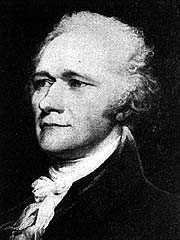Alexander Hamilton
 |
| Alexander Hamilton helped to establish the U.S. financial and banking system as the first secretary of the treasury. Image © 2002 www.clipart.com. |
As the Lewis and Clark expedition made its way nearly 400 miles up the Missouri River in early July 1804, one of the most infamous incidents in American history was taking place back on the other side of the continent. In Weehawken, NJ, across the Hudson from New York City, two of the country's more famous statesmen, Aaron Burr and Alexander Hamilton, dueled. The confrontation cost Hamilton his life, a twisted ending for the man whose image adorns the $10 bill.
Hamilton was born a British subject on Nevis Island in the West Indies on Jan. 11, 1755, and grew up in America. Heavy responsibility fell upon his shoulders at a very young age. Business failures left his father bankrupt, and his mother died shortly after. At 12 Hamilton entered the workforce as a clerk and apprentice at the counting house of Cruger and Beekman. By 15 he was running the business. The work left Hamilton few opportunities for regular schooling, although thanks to his mother, he spoke fluent French, a rare skill in the colonies. The ambitious Hamilton longed to increase his standing. At 14 he wrote in a letter, "my ambition is prevalent, so that I contemn the groveling condition of a clerk or the like…and would willingly risk my life, though not my character, to exalt my station." By 1772 thanks to his aunt's scrimping and saving, he enrolled at Kings College (now Columbia). His station in life was about to change.
Hamilton also had military ambitions. While at Kings College, he joined a patriot volunteer company. In 1775 he quit school and the next year was commissioned a captain in an artillery company. The proficiency and bravery he displayed in battle against the British troops at Nassau Hall, NY, impressed George Washington. Hamilton soon was promoted to lieutenant colonel and became Washington's personal secretary and aide. Hamilton spent the winter of 1777-1778 with Washington and the Continental Army at Valley Forge.
Washington and Hamilton reportedly had a "run-in" in 1781 that resulted in a "parting of the ways." Hamilton took command of another battalion and led an attack at Yorktown. Even though he became a colonel in 1783, he retired from military service that year. While in the military he had married Elizabeth Schuyler in 1780. She was the daughter of Gen. Philip Schuyler. Their happy marriage produced eight children.
Hamilton next turned to politics. He left quite a mark there. He authored a draft of a report which resulted in the Constitutional Convention. He also wrote more than half of the Federalist papers. His biggest impact, though, came as Washington's treasury secretary.
Hamilton is considered the father of the U.S. financial and banking system. As the first secretary of the treasury, Hamilton developed a plan for constructing a financial system for the new nation and building an economic system to help it survive and expand. Of primary importance was repayment of the Revolutionary War debt and the establishment of trade relations among the states with European countries. Exploration of the terra incognita west of the Mississippi and an all-water route to the Pacific were essential to the expansion of commerce. Hamilton joined Washington, Robert Morris, and Thomas Jefferson in proposing to the American Philosophical Society of Philadelphia that an expedition to the Pacific be financed.
Early in 1795 Hamilton resigned as treasury secretary, saying he could not live off the $3,500 annual salary. He returned to practicing law in New York where he earned $12,000 a year. He remained an adviser to Washington and wrote Washington's farewell address in 1796.
From 1798-1800 Hamilton returned to military service as a major general in the army Washington had organized for an impending war with France.
Hamilton was often described as indiscreet, opinionated, and uncompromising. For 15 years Hamilton sparred with his friend and political adversary, Aaron Burr. Over that time they grew into fierce rivals. The intense rivalry was fueled by many issues, including differing social status, opposing views on military policy, and competition as adversarial trial lawyers. When Burr left law to devote himself solely to politics, it rekindled Hamilton's hostility. Hamilton worked diligently to block Burr's political ambitions. When Hamilton publicly maligned Burr as "a dangerous man, and one who ought not to be trusted with the reins of government," Burr demanded a formal explanation and apology. Hamilton chose to evade the issue despite Burr's
pressing demands. On June 27, 1804, Burr formally challenged Hamilton to a duel, and Hamilton accepted. The duel took place on July 11, 1804, leaving Hamilton mortally wounded. After spending the night in extreme pain, he died the next day at the age of 47. Historians still debate today whether Hamilton's first shot, which sailed high, was an accident caused by a hair trigger or an intentional act of valor. This tragically extreme incident reflected the depth of animosity aroused by the first emergence of the political party system of the United States.
Hamilton's legacy was the prophetic vision of the United States as a global power stabilized by capitalism. The Louisiana Purchase and the Lewis and Clark expedition were significant foundations of this capitalism.
< back | next > |



